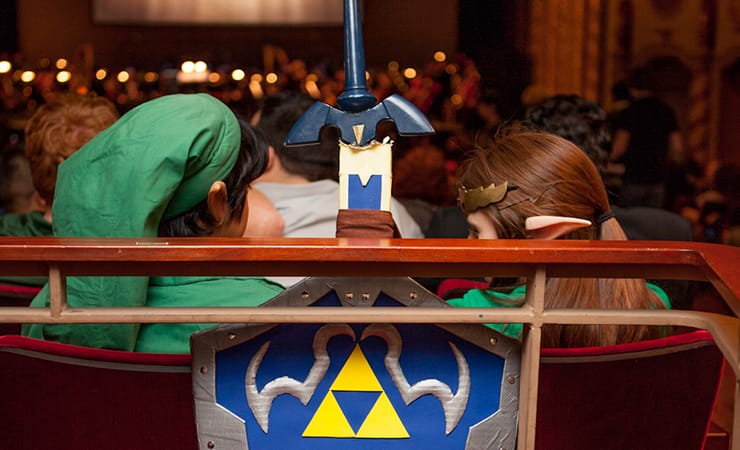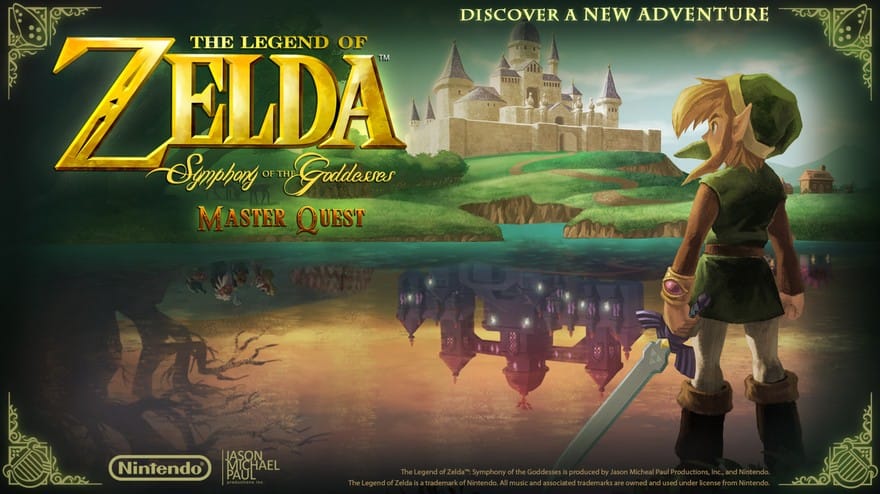Videogames are helping to keep the symphony orchestra afloat

This past Tuesday The Legend of Zelda: Symphony of the Goddesses, a 74-piece orchestra touring music from Ocarina of Time, Wind Waker, Twilight Princess, A Link to the Past, Link’s Awakening and more, found its way onto the Ed Sullivan Theater with Stephen Colbert. Conductor Amy Andersson can be seen oozing exuberance during the performance, beaming as the medley comes to a close before holding up a Link plushie to the audience like he’s Simba overlooking his kingdom.
“I thought it was very beautiful,” associate concert master Heidi Harris said to The Wall Street Journal. “I dislike videogames less now.”
It’s a quote that perfectly captures the bipolar relationship orchestras have developed toward the medium that is almost single-handedly bringing it back from the brink of cultural and financial extinction. Having begun its first season three years ago, the videogame oriented content continues to make waves among the more, erm, “reserved” concertgoer crowd. While many programmers and conductors appear to roll their eyes at such a debasement of their art, they still gladly take the money that’s off-setting the orchestra’s annual 2.8% decline in sales.
At the Mann center, for example, Symphony of the Goddesses attracts an average of 6,500 attendees—basically double the amount of any other classical event. Nashville Symphony vice president of artistic administration Larry Tucker admits: “I would not want to go through a season without it,” seeing as attendees spend about $13,000 on action figures, posters, T-shirts and other souvenirs. While, “usually if you sell $2,000 or $3,000, it’s a good night for a pops performance.”
the bipolar relationship orchestras have developed toward the medium
As Wired contributing editor Chris Kohler points out in a tweet, despite the begrudging attitude many demonstrate nowadays, the more recent rhetoric on the subject of orchestral videogame events is still a far side better than what it was even just a decade ago. In an article about a Final Fantasy concert back in 2004, The New York Times reports that Square Enix had to go through many hoops to persuade the Philharmonic to defile its good name with games. Supposedly, the orchestra only relented after being told, “‘Don’t worry, we’re not going to tarnish your image.'” Meanwhile, in the same breath, Philharmonic flutist Catherine Ransom Karoly can be seen calling the Final Fantasy music “on the level of Muzak and pretty much completely without integrity. It’s really, really cheesy.”
The Wall Street Journal quotes one weekly classical music concertgoer, Roderick Branch, as saying that, “from a business-strategy perspective, it completely devalues the brand.” He relates that the exercise is bascially “akin to Mouton Rothschild using its wine to make and sell sangria.” Personally, I’m not sure what one gains by being anti-Sangria, besides the lacking the enjoyment of a delicious drink. But, to each their own.

While many classical concertgoers look down on the tendency toward more rambunctious reactions from the videogame crowd (meaning: anything above a light pointer finger clap), they also presumably lack an understanding of the complex relationship established between a player and this emotional entry point to some of their favorite virtual experiences. Of course, videogame scores composed by the likes of Koji Kondo must do more than just challenge orchestras and listeners. Videogame scores must strike a universal chord that perhaps the more elite minded classical fandom might do well to try and decipher. After all, there was a point when Beethoven was the most popular pop music of his time. And everyone who said that it’d die down once the fad passed would sure feel silly right about now.
You can buy tickets to The Legend of Zelda: Symphony of the Goddesses’ Master Quest global tour now.
///
Header photo Credit: Matt Le, found via Symphony of the Goddesses website.



